
As I worked to overcome compulsive eating, my journey quickly became a spiritual one, and Pema Chodron quotes became a source of solace. Pema is a revered Tibetan Buddhist nun, bestselling author, and spiritual leader known for her insights on handling life’s challenges, embracing uncertainty, and fostering compassion.
The year that I discovered Pema Chodron was 2016, which just so happened to be the same year that I gave up dieting. Was this serendipity or causality? I honestly don’t know. All I know is that I was utterly fed up with constantly gaining and losing the same ten pounds only to end up exactly where I started but feeling even more frustrated and deprived.
In giving up dieting, my exploration led me inward, where I discovered that a psycho-spiritual approach was far more effective than any diet. During this transformative time, Pema Chodron’s bestselling book, When Things Fall Apart, held a permanent place on my nightstand. Whenever I felt like I needed a reassuring hand to hold while navigating life’s uncertainty, I’d reach for Pema’s.
The Best Pema Chodron Quotes & What They Mean on the Path to Stopping Compulsive Eating
I’m excited to share my favorite Pema Chodron quotes and unpack them in the context of stopping compulsive eating. Her work perfectly embodies my psycho-spiritual approach—a path I call Psycho-Spiritual Wellness. It’s about using your relationship with food as a doorway into personal and spiritual growth, and who better to turn to than a spiritual thought leader like Pema.
Below are my favorite Pema Chodron quotes along with what they mean on the journey towards a peaceful, balanced relationship with food. This is just like my roundup of Buddhist quotes, except they’re all from one amazing teacher.
#1 Beloved Pema Chodron Quote
“Generally speaking, we regard discomfort in any form as bad news. But for practitioners or spiritual warriors—people who have a certain hunger to know what is true—feelings like disappointment, embarrassment, irritation, resentment, anger, jealousy, and fear, instead of being bad news, are actually very clear moments that teach us where it is that we’re holding back. They teach us to perk up and lean in when we feel we’d rather collapse and back away. They’re like messengers that show us, with terrifying clarity, exactly where we’re stuck.”
- Pema Chodron
Ah, yes. This Pema quote encapsulates the idea that, behind every compulsion and every desire to eat without hunger, there’s an uncomfortable emotion that needs your attention. Pema reminds us to “perk up” and turn inward to face what’s troubling us instead of seeking escape, such as through food.
This is the premise behind my Stop, Drop, & Feel® method for stopping compulsive eating. It asks you to stop and feel your feelings in the precise moment that you want to eat without hunger. Although it sounds simple, it’s exceptionally difficult, as anyone who has tried it can tell you.

After all, the nature of compulsion involves flinging ourselves away from our pain, or to use Pema’s words, collapsing and backing away. To try and sit still without flinging or collapsing into food, that’s a tall ask—and that’s the path of the spiritual warrior.
To tie in some relevant research, a study published in the journal Eating Behaviors reveals that enhancing distress tolerance can reduce compulsive eating.[1] Distress tolerance involves your ability to endure emotional discomfort, and one way to build it is to practice holding space for it. In other words, training in the ability to “perk up and lean in” can help you stop compulsive eating.
#2 Beloved Pema Chodron Quote
“So even if the hot loneliness is there, and for 1.6 seconds we sit with that restlessness when yesterday we couldn't sit for even one, that's the journey of the warrior.”
- Pema Chodron
Loneliness deserves special attention on the path to stopping emotional eating. According to a study published in The International Journal Of Eating Disorders, loneliness can not only trigger emotional eating, but habitual overeating can also cause feelings of isolation.[2]
Raise your hand if you’ve ever reached for food because you felt lonely… I’d certainly be raising my hand. When you’re stuck at home because you either don’t have plans or your previous plans cancelled on you, it’s hard not to reach for something tasty to fill the void.
Back when I was still struggling with compulsive eating, I also struggled with judging myself as a “loser” for staying home on a Friday night. On the Fridays where I unsuccessfully made plans to keep myself occupied, I’d gravitate towards all kinds of snacks even though I wasn’t hungry, and it was a difficult cycle to break—until I stopped dieting and delved into the necessary emotional work to pull myself out of the pattern.
#3 Beloved Pema Chodron Quote
“Things falling apart is a kind of testing and also a kind of healing. We think that the point is to pass the test or to overcome the problem, but the truth is that things don’t really get solved. They come together and they fall apart. Then they come together again and fall apart again. It’s just like that. The healing comes from letting there be room for all of this to happen: room for grief, for relief, for misery, for joy.”
- Pema Chodron
Life constantly ebbs and flows, and at the very lowest point of the “ebb” (or the descent), this is known as the nadir. I don’t like the nadir. I hate the nadir. I usually panic and flail and think I’m never going to feel better again unless I do everything possible to try and fix it. As you can imagine, this pattern used to fuel lots of compulsive eating.
Pema’s words would remind me that “this too shall pass.” That the nadir actually has a silver lining: it’s only up from here. But of course, we never know when we’re fully in the nadir until it passes. This is why I used to (and still do sometimes) panic whenever things begin to fall apart: I don’t know how far the descent will go, and that’s scary.
In these moments, I try to carve out just two minutes to sit still with the edginess of uncertainty, panic, fear, frustration, and every other emotion you can think of. This is the essence of my Stop, Drop, & Feel method.
By sitting still with edgy emotions, you can develop tolerance for them. This is particularly noteworthy because intolerance for uncertainty is associated with anxiety and disordered eating, and addressing it early on often helps recovery.[3]
#4 Beloved Pema Chodron Quote
“We can meet our match with a poodle or a raging guard dog, but the interesting question is—what happens next? The spiritual journey involves going beyond hope and fear, stepping into unknown territory, continually moving forward. The most important aspect of being on the spiritual path may be to just keep moving.”
- Pema Chodron
I love this Pema Chodron quote because it reminds me that, no matter how “big” or “small” a problem is, if I’m at my wits end and it triggers the desire to eat without hunger, it means I’m at my wits end—period. It doesn’t mean I’m weak or broken. It means I’ve met my match. This inspires so much more compassion than beating myself up.
Self-compassion is a precious gift, especially with 83% of women feeling dissatisfied with their bodies, according to a study published in Women & Health.[4] Eighty three percent! If we can help ease the inner critic slowly but surely, self-compassion has a much greater chance of flourishing.
#5 Beloved Pema Chodron Quote
“How do we work with our minds when we meet our match? Rather than indulge or reject our experience, we can somehow let the energy of the emotion, the quality of what we’re feeling, pierce us to the heart. This is easier said than done, but it’s a noble way to live. It’s definitely the path of compassion—the path of cultivating human bravery and kindheartedness.”
- Pema Chodron
I absolutely love this quote, because it encapsulates exactly what the Stop, Drop, & Feel is: letting uncomfortable emotions in and allowing them to, quite honestly, pierce your heart.
The emotions that trigger the desire to eat beyond fullness are big, edgy emotions. When I say, “Do the Stop, Drop, & Feel in the precise moment that you want to eat beyond fullness,” what this actually means is, “Please carve out two minutes of time to allow your emotions to annihilate you.” It’s not a sexy premise, but as Pema said, it’s a noble path.
Indeed, enhancing your ability to weather the emotional storm helps reduce compulsive eating tendencies, according to a study published in Eating Behaviors.[5] And also according to Pema Chodron.

Take some spiritual inspiration to-go: Keep exploring this unique approach to making peace with food by downloading my free ebook, The Spiritual Seeker’s Guide to Stop Binge Eating. It's right up your alley, and SO good.
#6 Beloved Pema Chodron Quote
“No one ever tells us to stop running away from fear. We are very rarely told to move closer, to just be there, to become familiar with fear.”
- Pema Chodron
I feel a sense of relief when I read this quote from Pema. It reminds me that struggling is normal. This is easy to forget sometimes in a society where success is associated with happiness and feeling bad is associated with doing something wrong.
Even research published in the journal Emotion supports the notion that, when you value happiness, you’re less likely to feel happy because you’re more likely to feel disappointed.[6] Indeed, it’s not just in your head when you feel like you’re less happy when you’re focused on trying to be happy. You are normal.
But what about those times where food feels like it’s the only thing that makes you happy? Well, then you’re really in trouble, because it reinforces the idea that happiness is elusive and food is the only hope of feeling better.
While food does indeed make us feel good—and enjoyment of food should never be neglected because it’s an important healthy eating recommendation[7]—we also need to make friends with the awkward and edgy space of unhappiness and yearning.
Indeed, Pema Chodron quotes don’t remind us to feel better. They simply remind us to feel, and that’s why I love her oh so very much.
#7 Beloved Pema Chodron Quote
“The most difficult times for many of us are the ones we give ourselves. Yet, it’s never too late or too early to practice loving-kindness.”
- Pema Chodron
Self-criticism is all too familiar for those of us that struggle with compulsive eating. It’s not uncommon for overeaters to battle with thoughts like “I feel fat and ugly” or “I hate my body.” Self-compassion is a clear antidote, but it’s not always accessible. I often felt enormously frustrated by this.
Turns out, I needed about five years of therapy and The Hoffman Process to unlock that one, but there was another step that helped too: giving up dieting. Dieting gives the inner critic way too much fuel. When there are rules to break, the inner critic has an endless supply of material to criticize.
But when we put down the food rules and embrace an intuitive relationship with food, suddenly there are less rules to break, which means the inner critic has less material to work with. Notice that I didn’t say there are no rules to break, because the inner critic is crafty and can even criticize eating past fullness or eating without hunger, but the goal is progress, not perfection.
Turning Food Into a Spiritual Journey
Over time, as I gave up dieting and focused all my energy on the inner work, I gained traction. I stopped binge eating completely and diminished habits of overeating greatly. And on the occasion that I do overeat, I can finally embrace those mistakes with compassion.
So, hold these Pema Chodron quotes close to your heart and practice as much loving-kindness as possible. Focus on stepping closer to your intuition and “perking up” instead of “backing away” when discomfort rolls around, and you’ll be well on your way to feeling normal around food again.
To learn more about using food as a doorway into spiritual growth, I invite you to explore my free resources below that expand upon Psycho-Spiritual Wellness, a path to stopping compulsive eating rooted purely in psychology and spirituality. It’s right up your alley.



